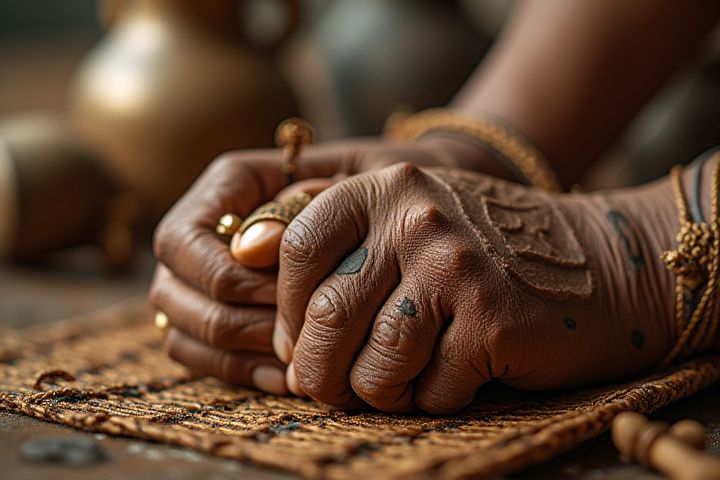
Traditional crafts in Nigeria encompass a rich tapestry of cultural heritage, reflecting the diverse ethnic groups and their unique practices. Pottery, for instance, remains a significant craft, with artisans in regions like Jalingo showcasing intricate designs and techniques passed down through generations. Weaving, particularly among the Igbo and Yoruba communities, produces vibrant textiles such as Aso Oke and Kente, which are often used in ceremonial attire. Wood carving is another prominent craft, with skilled craftsmen creating masks and figures that serve both artistic and spiritual purposes. Engaging with these traditional crafts allows you to appreciate the artistry, historical significance, and contemporary relevance of Nigeria's cultural identity.
Adire textile
Adire textile, a traditional craft hailing from Nigeria, showcases intricate indigo-dyed patterns often created through resist dyeing techniques. This vibrant textile is deeply rooted in Yoruba culture, reflecting both heritage and artistic expression. Artisans use various natural dyes and traditional methods, ensuring the preservation of age-old practices while promoting sustainable fashion. By integrating Adire into your wardrobe, you support local artisans and contribute to the revival of this significant cultural craft.
Aso-Oke weaving
Aso-Oke weaving is a prestigious traditional craft in Nigeria, particularly associated with the Yoruba people. This intricate textile, made from hand-woven cotton and silk, is characterized by its vibrant colors and unique patterns, often used in ceremonial attire. Artisans employ time-honored techniques that have been passed down through generations, ensuring the preservation of cultural heritage. You can experience this rich artistry at local markets, where beautifully crafted Aso-Oke pieces are available, showcasing the skill and creativity of Nigerian weavers.
Igbo-Ukwu bronze
Igbo-Ukwu bronze craftsmanship, originating from southeastern Nigeria, showcases the advanced metallurgical skills of the ancient Igbo civilization. Renowned for intricate designs and rich symbolism, these bronze artifacts often reflect the socio-political structures and cultural beliefs of the time. The legendary discoveries at the Igbo-Ukwu site have revealed sophisticated lost-wax casting techniques, illustrating the artisans' mastery over materials and forms. Owning or studying these bronze works provides insights into Nigeria's historical heritage and artistic legacy.
Nok terracotta
Nok terracotta, renowned for its intricate artistry, represents one of Nigeria's oldest and most significant traditional crafts, dating back to around 1000 BCE. These sculptures, characterized by their unique human and animal forms, provide insight into the ancient Nok culture's social and spiritual beliefs. Artisans utilize clay sourced from local deposits, hand-shaping each piece before firing it in open kilns, a technique that has been passed down through generations. The preservation of Nok terracotta not only highlights Nigeria's rich cultural heritage but also serves as a crucial element in the study of early African civilizations.
Calabash carving
Calabash carving in Nigeria is a vibrant traditional craft that showcases the artistic skills of local artisans. This intricate process involves selecting ripe calabash fruits, which are dried, shaped, and skillfully decorated with unique patterns and designs that reflect cultural heritage. The finished calabash products, ranging from bowls and musical instruments to functional art pieces, often serve practical purposes in daily life and ceremonial occasions. Engaging with this craft not only fosters a connection to Nigeria's rich history but also supports local economies through the promotion of artisanal products.
Beadwork
Beadwork in Nigeria showcases intricate designs and cultural significance, reflecting the diverse ethnic groups and their unique traditions. Artisans use locally sourced materials such as glass, clay, and gemstones to create stunning, handmade jewelry and decorative items. The vibrant colors and patterns employed in Nigerian beadwork often convey messages of identity, status, and spirituality. Engaging with this craft not only supports local economies but also preserves the rich heritage of Nigerian art and culture.
Leatherwork
Leatherwork in Nigeria showcases unique craftsmanship, highlighting traditional techniques passed down through generations. Artisans use locally sourced animal hides to create a variety of products, including bags, shoes, and intricate garments that reflect cultural heritage. The vibrant patterns and textures often draw inspiration from indigenous art, making each item a representation of Nigeria's diverse ethnicities. By supporting local leatherworkers, you not only appreciate quality craftsmanship but also contribute to the preservation of Nigeria's rich cultural legacy.
Wood carving
Wood carving in Nigeria showcases intricate artistry and cultural heritage, deeply rooted in diverse ethnic traditions. Skilled artisans utilize locally sourced hardwoods such as mahogany and iroko to create functional objects and elaborate sculptures that reflect religious beliefs and societal narratives. Each piece often embodies symbolism, conveying messages about identity, community, and history. Engaging with these crafts allows you to appreciate the craftsmanship and the stories interwoven with Nigeria's vibrant cultural tapestry.
Pottery
Pottery in Nigeria showcases a rich cultural heritage, characterized by diverse techniques and styles unique to various ethnic groups. Local artisans skillfully shape clay into functional and decorative items, such as pots, plates, and sculptures, often using traditional hand-building methods or a potter's wheel. Notable regions like the Nok culture, known for its terracotta sculptures, highlight the historical significance and artistic innovation in Nigerian pottery. By incorporating local motifs and utilitarian designs, these handcrafted pieces reflect both the practical needs and aesthetic values of Nigerian communities.
Basket weaving
Basket weaving in Nigeria is a vibrant traditional craft, showcasing the intricate skills and creativity of local artisans. Various regions, such as the Southeast and North, produce uniquely styled baskets, utilizing indigenous materials like rattan, palm fronds, and grasses. Each woven piece reflects cultural significance, often serving functional purposes in daily life or as art pieces for decorative use. You can explore these artisan communities to appreciate not only the craftsmanship but also the rich heritage and storytelling woven into each basket.
